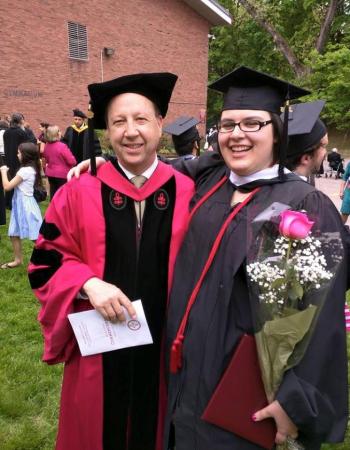If I’m being totally honest, I didn’t always have a great relationship with St. Paul. I found—and sometimes still find— reading him a struggle. This is particularly as a woman. Not only are a lot of his texts are taken out of context and weaponized, but even the ones that haven’t been can still be difficult.
A woman wants to chant? She should be silent in the churches (1 Corinthians 14:34). A woman can’t have children? Where will her salvation come from, then? (1 Timothy 2:15. Though many scholars believe 1 Timothy is not an authentic Pauline letter, I was never taught that when reading Paul, so my experience of this letter is that it’s written by Paul, so I’m including it here). A woman’s husband wants to control her? She should be subservient (Ephesians 5:22-23). These messages are difficult to read and to reconcile with the trust I have in Orthodox theology and the trust I have in my own lived experiences. But now I can say that, even when I struggle with St. Paul, I love him.
Full disclosure: this isn’t a post about St. Paul’s various passages and what they mean. If folks want a course like that for women, let Axia know. But this post is a story about the process I went through to have a loving and healthy relationship with St. Paul—even though I wasn’t sure I wanted one.
In 2013, I took a graduate course on the Pauline Epistles with Dr. Bruce Beck at Hellenic College /Holy Cross. On the first day of class, he asked us what we thought of St. Paul. I said, “I’m not so sure about him.” Instead of scowling, Dr. Beck accepted this with love, openness, and no sense of being threatened as a scholar or Orthodox Christian.
(The icon shows St Paul whispering into St John Chrysostom’s ear. It is by UK Coptic Icons. The photo shows Rachel Contos with her professor Dr Bruce Beck at her graduation from Hellenic College.)
And thus began a process. Lesson one was to get to know St. Paul. Dr. Beck set us to reading St. John Chrysostom’s work on St. Paul—not necessarily to memorize St. John’s views, but to understand what it looked like to have a relationship of love with an author. Did you know that there exists an icon of St. John Chrysostom where St. Paul is whispering in his ear? Dr. Beck encouraged us to get to know St. Paul well enough to feel like that. Not always to know what St. Paul meant when he wrote a passage, but even what he might want us to get out of it now—or both.
The second lesson was to accept and acknowledge my feelings about the epistles. Dr. Beck had everyone in class read the daily epistle and write a journal about it. There were so many times when I would find solace in the reading—and still do! And it gives me the chance to be thankful for rather than resentful of St. Paul and his Epistles. So now, when I encounter a passage that makes me feel uncomfortable, I’m honest with myself, approach the passage with curiosity, and always let St. Paul know. This leads me to the next lesson.
Third, I learned was that not only are my feeling toward a passage valid, but also that I am allowed to express that to St. Paul himself. Dr. Beck once asked me if I had considered just letting St. Paul know how I felt about what he had written. Nope. So, I started doing that! I’d pray and ask for the guidance I needed to understand, or to have love when I didn’t.
So, I found myself praying to St. Paul as part of even my most causal paper-writing. “St. Paul, I have to write a reflection on this passage—please help me understand.” A closeness grew out of that relationship that affected how I approached difficult Pauline passages, and deepened my love for ones that I didn’t find difficult.
My final paper for Dr. Beck’s course was on 1 Corinthians 14:34 “women shall be silent in the churches.” Every day I asked St. Paul for his guidance, I thanked him for his passages of solace, and let him know I was irritated that he put something so contextual in a document that would one day be 2,000 years old! And never once did I feel unloved in my struggle, in my joy, or in ultimately writing a paper that tried to recontextualize St. Paul.
Do I always “get” why St. Paul said what he did? Nope! Will I ever? Probably not. Will I accept it all without context? No, I won’t. But will I always ask for St. Paul’s guidance when I’m frustrated with him and be honest with him—and will I love St. Paul through these struggles? Of course, I will. Because even if I understood it all and knew every answer, to quote St. Paul, if I “do not have love, I gain nothing” (1 Corinthians 13).
(The icon shows St. Paul whispering into the ear of St. John Chrysostom. It is by UK Coptic Icons. The photograph shows Rachel Contos with her professor Bruce Beck at her graduation from Hellenic College.)


Rachel Contos holds a masters in theology from Marquette University.


